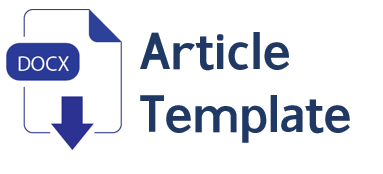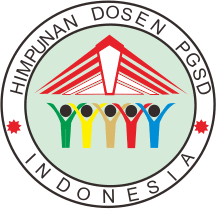PENGEMBANGAN MODUL PPKN MENGGUNAKAN MODEL EXAMPLE NON EXAMPLE UNTUK MENINGKATKAN AKTIVITAS BELAJAR SISWA
Abstract
Keywords
Full Text:
PDFReferences
Arsyad. 2011. Media Pembelajaran. Jakarta: PT Raja Grafindo
Daryanto, (2013). Inovasi Pembelajaran Efektif. Bandung: Yrma Widya.
Depdiknas. 2003. Kurikulum 2004 Standart Kompetensi. Jakarta: Puskur. Dit. PTKSD
E. Mulyasa, Kurikulum Berbasasis Kompetensi (Konsep, Kerakteristik, Implementasi), (Bandung: Remaja Rosdakarya, 2002)
E. Mulyasa, Kurikulum Berbasis Kompetensi, (Bandung: Remaja Rosdakarya Offset, 2004)
E. Mulyasa, Menjadi Guru Profesional Menciptakan Pembelajaran Kreatif dan Menyenangkan, (Bandung: Remaja Rosda Karya, 2005)
Eva Betty Simanjuntak. 2017 Meningkatkan Kemampuan Menulis Dalam Pembelajaran Bahasa Indonesia Melalui Model Example Non Example Di Kelas V Sekolah Dasar Negeri Medan. School Education Journal PGSD FIP UNIMED VOL 7, NO 1
Hamalik, Oemar. (2001). Proses Belajar Mengajar. Jakarta : Bumi Aksara.
Ibrahim, M. 2000. Pembelajaran Kooperatif. Surabaya: University sPress.
Istarani, 2011. 58 Model Pembelajaran Inovatif (Reverensi Guru Dalam Menentukan Model Pembelajaran) . Medan : Media Persada
Komalasari, Kokom. 2010. Pembelajaran Kontekstual Konsep dan Aplikasi. Bandung: Refika Aditama.
Krista Surbakti. Upaya Meningkatkan Hasil Belajar PKN Siswa Dengan Menggunakan Model Talking Stick Materi Sistem Pemerintahan Pusat. Jurnal tematik. VOL 8, NO 1 (2018).
Nur, M. dan Wikandari, P.R. 2000. Pengajaran Berpusat kepada Siswa dan Pendekatan Konstruktivistik dalam Pengajaran. Surabaya: Universitas Negeri Surabaya.
Putra, N. 2013. Research & Development. Jakarta: Raja Grafindo Persada Jakarta.
Rochyandi, Yadi. (2004). Model Pembelajaran Kooperatif. Surabaya: Masmedia Buana Pustaka.
Rusman. (2011). Model-Model Pembelajaran Mengembangkan Profesionalisme Guru. Jakarta: Rajagrafindo Persada.
Slavin, Robert. 2002. Kooperatif Learning, Jakarta: Rineka Cipta.
Sugiyono. 2010. Metode Penelitian Pendidikan Pendekatan Kuantitatif, kualitatif, dan R&D. Bandung: Alfabeta.
Sungkono. 2003. Pengembangan Dan Pemanfaatan Bahan Ajar Modul Dalam Proses Pembelajaran. Makalah Yogyakarta: FIP UNY
DOI: https://doi.org/10.30596/ejoes.v2i1.6611
Refbacks
- There are currently no refbacks.
(EJOES) Educational Journal of Elementary School
Department of Elementary School Teacher Educational, University of Muhammadiya Sumatera UtaraKampus 1 FKIP UMSU
Jl. Kapten Muchtar Basri No.3, Glugur Darat II,Medan
Sumatera Utara-20238
E-mail: ejoes@umsu.ac.id

Educational Journal of Elementary School (EJoES) is licensed under a Creative Commons Attribution-ShareAlike 4.0 International License








